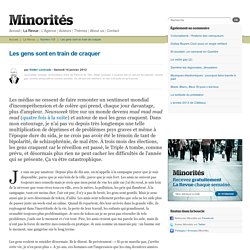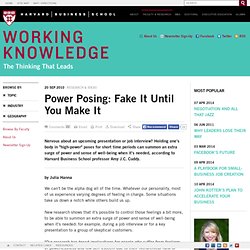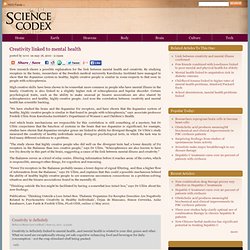

Hidden Persuaders II. Les gens sont en train de craquer. Les gens veulent se suicider désormais.

Ils le disent. Ils préviennent : « Si ça ne marche pas, j'arrête cette vie, je n'en peux plus ». À 30 ans, ces hommes ont l'impression que les cinq dernières années ont été trop dures et ils n'ont aucun espoir pour les cinq années à venir. C'est une décennie perdue de trop. À Act Up, par exemple, on a toujours eu des freaks et des skyzos et des alcoolos, ceux que Aides nous envoyait parce qu'ils étaient ingérables et certains l'étaient vraiment, ils foutaient le bazar, ils étaient trop paumés.
À un moment, en 2008, beaucoup d'articles se sont fait l'écho d'un élan de générosité, quand tant de jeunes ou d'adultes sans travail étaient tentés par l'expérience associative, apportant leur savoir et leur générosité. Et tout ça parce que Obama a déçu très profondément et pour toujours, sur TOUS les sujets et que Sarko ne cesse de nous plonger vers le pire. Les nouveaux médias sociaux ne sont peut-être pas si nouveaux que ça. Le passé aide toujours à comprendre le présent.

Xavier de la Porte nous ouvre cette semaine la porte de l'histoire de notre rapport aux technologies. "L'infobésité", l'une des plaie de l'internet, est-elle propre au réseau ? La lecture de la semaine, il s'agit d'un post du blog que Cynthia Haven, critique littéraire, tient sur le site de l'université de Stanford, en Californie. Le titre du post : "Les nouveaux médias sociaux ne sont peut-être pas si nouveaux que ça". Power Posing: Fake It Until You Make It. We can't be the alpha dog all of the time.

Whatever our personality, most of us experience varying degrees of feeling in charge. Some situations take us down a notch while others build us up. New research shows that it's possible to control those feelings a bit more, to be able to summon an extra surge of power and sense of well-being when it's needed: for example, during a job interview or for a key presentation to a group of skeptical customers. "Our research has broad implications for people who suffer from feelings of powerlessness and low self-esteem due to their hierarchical rank or lack of resources," says HBS assistant professor Amy J.C.
Cuddy, one of the researchers on the study. “It’s not about the content of the message, but how you’re communicating it.” The result? "We used to think that emotion ended on the face," Cuddy says. The experiment In their article, to be published in a forthcoming Psychological Science, Cuddy and coauthors Dana R. Why we judge Warmth versus competence. Synesthesia's blended senses. If you ask Emma Anders about the number five, she'll tell you that it's red.

She'll also tell you that five is a mischievous, self-centered brat — like a kid throwing a temper tantrum at a party. "Two is yellow, three is purple, four is an intense sky blue," says the 21-year old student at UC San Diego. "An eight is very noble and kind of held together, almost like a parent figure to five. The fine dopamine line between creativity and schizophrenia. New research shows a possible explanation for the link between mental health and creativity.

By studying receptors in the brain, researchers at the Swedish medical university Karolinska Institutet have managed to show that the dopamine system in healthy, highly creative people is similar in some respects to that seen in people with schizophrenia. High creative skills have been shown to be somewhat more common in people who have mental illness in the family. Creativity is also linked to a slightly higher risk of schizophrenia and bipolar disorder. Certain psychological traits, such as the ability to make unusual pr bizarre associations are also shared by schizophrenics and healthy, highly creative people. And now the correlation between creativity and mental health has scientific backing. "The study shows that highly creative people who did well on the divergent tests had a lower density of D2 receptors in the thalamus than less creative people," says Dr Ullén.